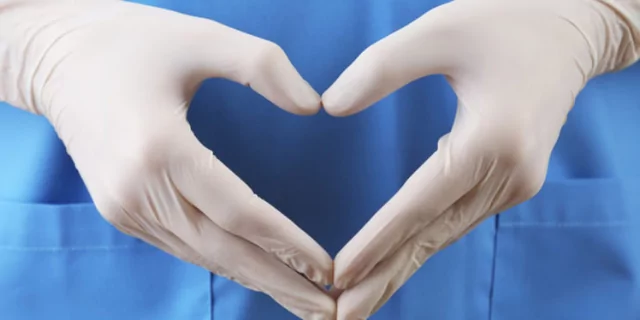
Fantastic General Dentistry in Juno Beach
Whether you’re coming in to get your own dental work done, or a family member’s, Weinberg Dentistry is a great solution that you can depend on! Our Juno Beach location works hard to make our patients as comfortable as possible and provide excellent service throughout your visit.
Dr. Weinberg is a skilled and experienced dentist that you can depend on, whether you’re here to get dental work done or just coming in for your biannual cleaning and exam. With our supportive staff, high-quality tech, and amazing dentist you can rest assured that you’re in great hands!
Maintain a healthy and beautiful smile and schedule an appointment with us today!
Why Do I Need to See a Dentist?
Dental treatment is crucial for people of all ages. Healthy habits help children’s adult teeth grow in healthier and help adults keep their real teeth longer!
As important as it is, keeping up good oral hygiene habits alone isn’t enough to keep your teeth and gums healthy. Alongside this, you should be visiting your dentist once every six months for a cleaning and exam.
Cleanings can get to any plaque buildup that your brush misses, and exams help catch any dental issues early on to prevent larger and costly procedures later.
If you are experiencing any symptoms or problems, make sure to visit Weinberg Dentistry as soon as you can.


Why Choose Weinberg Dentistry as Your Family Dentist?
When you visit Weinberg Dentistry in Juno Beach, you can be sure that you’ll be well taken care of. Dr. Weinberg is a skilled dentist, and our team works hard to make sure you’re as comfortable as possible while in the chair.
We know that it can sometimes be difficult or stressful to attend a dental appointment; that is why our team works hard to provide high-quality service. Dr. Weinberg uses high-quality tech to provide high-quality service and meets one-on-one with each patient to make sure that all their needs are met.
We look forward to meeting you and your whole family and helping your smiles all be bright and healthy!
Excellent Dental Care Is Right In Your Neighborhood, Call Now!
Good dental health means good health for the rest of your body as well. Here at Weinberg Dentistry, your oral health is our priority! Our team will make you feel comfortable for all the treatments you need. Schedule an appointment today!
Book Online'Check Out Our Amazing Patient Reviews!

Dental Issues Resolved by La Costa Dental Excellence
Common Dental Issues We Treat
Plaque and Tartar
Plaque and tartar buildup can seriously damage your teeth over time. This buildup slowly damages your gums and the protective enamel of your teeth, leading to cavities and gingivitis.
To protect your teeth from plaque, make sure to brush twice a day and floss daily. You should also make sure to schedule an appointment twice a year for a professional cleaning and oral exam. Your home toothbrush can still miss things despite diligent care; professional dental cleanings can get to everything the brushing and flossing don’t.
Filling Cavities
Cavities are formed when bacteria wears through your tooth enamel. The longer a cavity is left untreated, the worse it becomes. This eventually can cause pain and swelling if not caught and fixed right away.
To get a cavity fixed, you’ll come in for a dental filling. The dentist will clean the cavity and then use a moldable dental material such as resin, dental clay, or ceramic to fill in the affected area of your tooth. This thin protective coating defends your tooth from infection and bacteria, and applying it is a pain-free process.
Gingivitis and Periodontal Disease
Gingivitis is the dental term for mild gum disease, also called periodontal disease. Poor oral hygiene allows bacteria to build up between your gums and teeth, making them irritated, red, and swollen.
Symptoms of gingivitis include:
- Red, swollen gums.
- Gums that bleed easily.
- Bad breath.
- Gums that are sensitive to the touch.
While gingivitis is common and treatable, it’s important to take it seriously. Left untreated, it can develop into more serious periodontal disease, called periodontitis, and even result in tooth loss and bone decay.
Toothaches
Toothaches are caused by a variety of different dental issues and can be a warning sign that something is wrong. Common causes of toothaches include:
- Cavities.
- Gum disease.
- Tooth grinding.
An icepack on the outside of your jaw and over-the-counter pain relievers should help with the pain. However, if the toothache pain persists for a long time, you should check in with a dentist to see if there’s an immediate problem.
Chipped or Cracked Tooth
Chipped or cracked teeth are a common problem, but luckily, they’re fairly easy to fix. Depending on the severity of the damage, you’ll have several options to protect your tooth and restore it to its natural beauty.
For a small chip, your dentist might use a natural-looking resin to fill in the chip. You could also opt for a dental veneer, a thin shell that covers and reshapes your tooth. For a larger crack, you might need a dental crown, which is a cap that fits over your tooth and protects it from damage.
Tooth Appearance
Many people are concerned about the way their teeth look. Dentists today have a variety of options to give you a beautiful and natural-looking smile.
Tooth whitening is an easy fix for teeth that are stained or yellowed. Professional tooth whitening gives great results! Dental veneers are a great option for teeth that are misshapen or chipped. Veneers are thin shells, often made of porcelain, that cover the tooth. Straightening crooked teeth with orthodontics can also improve the appearance of your teeth and boost your confidence.
Mouth Sores
Common causes of mouth sores include:
- Irritation, from a chipped tooth or broken orthodontic wire.
- Infection from bacteria or a virus.
- Specific diseases or disorders.
Most mouth sores are often canker sores that will go away on their own. If you think that the sore is due to a broken wire or chipped tooth, your dentist should be able to fix that quickly.
But if the sores don’t go away, they could be a sign of an infection or even oral cancer. Make sure to see the dentist if you are experiencing a lot of pain and regular painkillers aren’t helping.
Impacted Teeth
An impacted tooth means that a tooth has failed to grow in fully, leaving it stuck in the gum tissue or bones. Impacted teeth can happen for a variety of reasons, but the most common one is that there is simply not enough space in the mouth for the tooth to grow in.
Not all impacted teeth cause problems, but often, they cause pain or other problems. Overcrowded teeth are more susceptible to decay, since they are harder to fully clean than well-spaced teeth. Impacted teeth often need to be adjusted or fully removed.
Tooth Erosion
Tooth erosion may sound like tooth decay, but while they are similar, they are not exactly the same problem. Tooth decay is caused by a buildup of bacteria. On the other hand, tooth erosion refers to wear to your tooth enamel caused by things other than oral bacteria, including the acids you eat or drink.
Fixing tooth erosion involves the application of tooth-colored resin to the surfaces of your teeth in order to protect the sensitive inside. In more severe cases, you may need a crown to fully protect the tooth.
Oral Cancer Screening
An important part of your dental checkups twice a year is screening for oral cancer. The dentist checks your mouth for any abnormalities, like swelling, white patches, sores, rough patches, or lumps. The dentist also examines your throat tissues for any areas of concern.
If the dentist finds something odd, they can then take a small sample of the area to test for cancer.
Getting regular dental checkups is crucial not just to prevent cavities, but also to catch cancer early. The earlier oral cancer is identified, the easier it is to treat.
What Can I Expect During My Exam and Cleaning?
1
Digital Imaging
X-rays are an important part of a regular dental checkup. They’re usually taken every one to two years. X-rays allow your dentist a better picture of what’s going on in your mouth. They can help diagnose cavities, impacted teeth, problems with tooth roots, bone loss, and tooth, root, or bone infection.
Your dentist will likely take your x-rays at the beginning of your appointment. The x-ray machine will be placed alongside your head to get images of your mouth and jaw. Then, your dentist will typically go over the images with you.
2
Thorough Cleaning
After the x-rays, we’ll do a careful cleaning of your teeth. During your checkup, we will clean your gums and teeth and remove any mineral buildup that your toothbrush may miss at home. This cleaning is one of the best ways to prevent cavities and gum disease.
After cleaning your teeth and gums we will polish your teeth to make sure nothing is in the way of the close-up dental exam the dentist will give your teeth. At the end of your visit, we can finish the process off with fluoride for added protection for your teeth.
3
Close Exam
Finally, we’ll examine your teeth and gums. We’ll study the digital x-rays of your mouth and check both your teeth and gums to make sure your mouth is healthy. If we see anything out of the ordinary, we’ll let you know!
It’s important to schedule a dental exam and cleaning with us once every six months so that we can ensure that your smile is healthy and catch any issues before they worsen. It’s much easier to treat cavities when they are small rather than waiting for those cavities to worsen until you need a full dental crown.
4
Recommended Treatments
After your exam, we’ll go over your current dental habits, and talk about any habits that might need to change. These home changes might include telling you to floss more or having you change to a soft-bristled toothbrush. If we notice any problems that need a follow-up appointment, we’ll also schedule those at this time.
After the dentist has finished, you’ll have the option to get a fluoride treatment before you go for the day. This strengthens the protective enamel of your teeth and helps to prevent cavities.
How To Maintain Great Oral Health
Visiting the dentist is important to your oral health, but maintaining a beautiful, healthy smile takes more than your dental cleaning twice a year! By forming a few simple habits, you’ll be able to help your dentist keep your teeth and mouth in top condition. Brushing and flossing regularly are important ways you can protect your mouth and teeth from harmful bacteria.
Brush
Brushing your teeth should be a basic part of your oral hygiene routine. It’s recommended that you brush for two minutes twice a day. You should make sure to brush all the surfaces of your teeth—inside and outside—with gentle pressure.
Floss
Flossing is equally as important as brushing. Ideally, you should floss once a day. Flossing helps remove plaque from between your teeth, where your toothbrush can’t reach. Guide the floss around the edge of each tooth to ensure you’re cleaning everywhere.
Rinse
After flossing, you should make sure to rinse your mouth out well. Flossing doesn’t always completely remove plaque or leftover food from your mouth. Rinsing your mouth washes away anything the floss dislodged but didn’t remove.
Checkups
While many of the important ways to maintain your oral health can be done at home, regular dentist visits are still crucial. Not only will you get your teeth professionally cleaned, but the dentist and hygienist can also catch any issues before they become big problems.
Other Dental Questions and Issues We Treat
Many dental issues can be prevented by having good oral hygiene and keeping regular cleanings and exams, but sometimes issues still occur. Here are some problems to be aware of in your oral health.
Red gums are sometimes just a sign of brushing too hard, but gum disease or gingivitis can be big problems if not treated. Symptoms include: swollen, tender, bleeding, gums or receding gum lines.
An ongoing toothache, or painful or difficult chewing could be a sign of a variety of different dental issues such as gingivitis, cavities, infection, or a broken or cracked tooth.
Loose permanent teeth are commonly a symptom of gum disease—which is the number one cause of tooth loss in American adults! Take steps to treat it before you lose your tooth entirely.
If you have extreme sensitivity to hot and cold foods, this could be a dental issue. Receding gums could expose more of your sensitive tooth roots, and a crack or cavity could be sensitive also.
Persistent jaw pain can often be treated by a dentist. Jaw pain can be caused by a misaligned bite or by nighttime clenching, and your dentist can help you tackle the problem.
Canker sores are no fun, and while they’re usually not a huge problem, frequent sores can indicate a larger problem with your oral health, like too much bacteria in your mouth.
Occasional dry mouth is normal, but if your mouth feels constantly dry, you might want to see a dentist. It could be related to gum disease, snoring, or a saliva production issue.
Everyone deals with bad breath every now and then, but persistent bad breath could be a sign that something more serious is at play, such as cavities, sinus infections, or gum disease.
It’s especially important to take good care of your teeth while pregnant. The changes in hormones can greatly affect your oral health, making you more at risk for tooth decay and gingivitis.
Why Wait To Take Care of Your Health? Schedule Now!
With our excellent service and quality dental work, you can be confident in your decision to come to Weinberg Dentistry. You’ll never feel like a box to be checked off—each and every patient is important to us! Schedule an appointment with our Juno Beach office today!
Book Online
